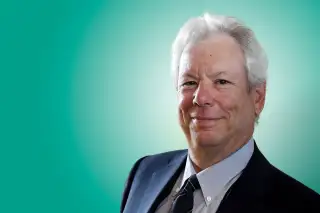Meet Richard Thaler, the Man Who Just Won the Nobel Prize for Helping You Save for Retirement

You may never have heard of Richard Thaler. But when he won the Nobel Prize for economics on Monday, personal finance experts let out a big cheer.
That’s because Thaler, who teaches at the University of Chicago, has been a font of insights that have helped Americans save and invest better. Among his biggest successes: inspiring Congress to overhaul the nation’s 401(k) system a decade ago -- a change that has helped millions of Americans prepare for retirement.
Thaler is famous for upending what was once economic conventional wisdom -- the notion that people are cool, rational economic actors, who can always be relied upon to do what's in their best interest. Thaler saw us for what we really are. Sometimes we're lazy or self-absorbed, but we're also more concerned with what is fair than what is most expedient.
Here is how Thaler himself described his work when Money interviewed him 2015:
The lesson of my field, behavioral economics, is that we need to understand the ways in which we differ from the rational human assumed in standard economic theory. I call this idealized person the "Econ."
My classic example of the difference between Econs and actual humans is something that happened years ago. I was having a dinner party for fellow economics grad students. Before dinner I served some cashew nuts along with cocktails, and everyone kept eating them. Soon their appetites were in danger, not to mention their waistlines. I grabbed the bowl and hid it in the kitchen. People were (a) happy, and (b) they realized their reaction conflicted with traditional economic theory. Econs are better off with more choices. We humans actually need help controlling our impulses -- nudges.
Thaler’s insight about "nudges" has influenced everything from how governments collect overdue taxes to how schools get kids to eat more veggies. But one of its biggest successes has come in retirement savings.
In 2006, Washington lawmakers built on Thaler’s research to reform America’s much-maligned 401(k) system. One key change: Instead of companies asking employees to sign up for a retirement savings plan, the new law encouraged employers to enroll workers automatically, but offer the right to opt out to anyone who didn’t want to participate.
The 2006 changes have been widely hailed as a success. In fact, they're one of the few consumer-oriented reforms in recent years to be embraced by both businesses and consumer advocates. How big is the impact of auto-enrollment? One 2015 Vanguard paper suggested that the practice more than doubles plan participation rates to more than 91% of workers from 42%.
To be sure, the nation’s 401(k) system is still far from perfect. One drawback: While many workers are now automatically enrolled, millions still aren’t saving a big enough portion of their paychecks.
Indeed, in his recent interview with Money, Thaler called for workers to be enrolled at higher savings rates.
Most companies using auto-enrollment set the default contribution rate too low. It’s stuck at 3% of salary, which was never intended by the law. Can you get people to save more than the default? Part of the answer is to combine auto-enrollment with auto-escalation. Research I did with Shlomo Benartzi of UCLA showed that even if people think they can save only a little right now, they’re willing to accept future increases in contributions, such as when they get raises. A state-of-the-art 401(k) should start out with auto-enrollment at 6% and escalate to at least 10% or higher. The evidence shows raising the default to 6% won’t lead to a high opt-out rate.
All the same, Thaler's prize reflects a big win for millions of would-be retirement savers who wanted to do better but just needed a little nudge.